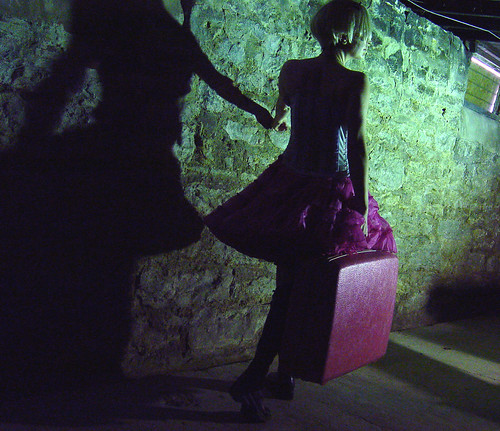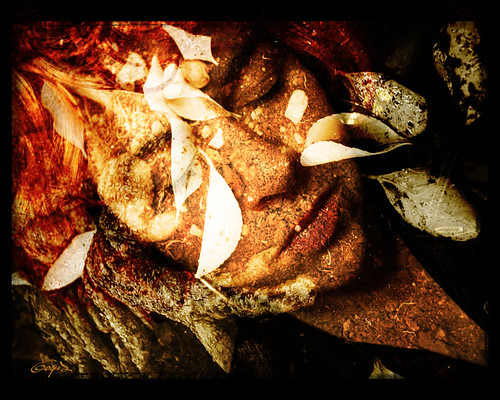You do not need to leave your room. Remain sitting at your table and listen. Do not even listen, simply wait, be quiet, still and solitary. The world will freely offer itself to you to be unmasked, it has no choice, it will roll in ecstasy at your feet. --FRANZ KAFKA
Monday, August 29, 2005
CRASH
Not that I'm being judgmental here, cause see I'm one of them, cell phone, sandwich and all--though in my case the sandwich is likely to be a veggie rollup. (Aren't I virtuous?) Yes, I'm out on the road with all the other stressed out, bird flipping drivers trying to negotiate the new millenium, or just get to work on time.
But I'm here to say I don't like it. And from the one-step-from psychotic rage reactions you get in ordinary traffic, I'm starting to suspect that a lot of people aren't having much fun either.
Then the other day, I had just returned from my two day seaside retreat and was feeling totally calm and zen-like. After I got off the bus, I found my happy little Honda Civic, put in my favorite CD, checked my cell phone messages one more time, and contemplated the shortest way home from the bus station. Though I'd only been away a couple of days, I was eager for the sight of the rooms where I live my life, and the people and pets with whom I live them.
However, as I was driving down the road that led from the bus station, a car abruptly pulled out of a parking spot--and crash! right into the rear door of my pristine little vehicle.
Since I'm not all that good with the practical realities of life, I tried to think of what I was supposed to do. The first thing that came to mind (probably from watching various movies and TV shows) was that I was supposed to get out and yell and wave my arms and call the other driver a MORON with a few choice epithets thrown in. But really, I'm not all that good at that sort of thing, and besides, as I said, I was in a particularly tranquil state of mind.
"Excuse me, but it seems as if you've just smashed up my car," I said politely approaching the other vehicle.
The driver was a teenage boy around my son's age. He even sported a rock shirt that looked like one I've laundered many times, and an impressive collection of tattoos. My sympathies were immediately aroused.
"I looked, but you weren't there!" he said hopelessly.
To which I could only explain that it seemed, in fact, I was there.
"Well, you were in my blind spot," he said, rubbing his goatee nervously.
"Maybe," I said, not wanting to be so rude as to point out that I was actually right in front of him.
I, too, stroked my chin, and tried to remember what they did next on the TV shows and movies.
"I think we should exchange information," the young man said, as if he'd just realized he was dealing with a less than fully functioning adult. He kindly offered to loan me a pen.
Well, that's when my trusty cell phone really came in handy. I could call my husband at work! Being better at reality than I am, he told me to get the license number, and then call the police.
Unfortunately, there was some kind of major action going on in town and every officer was out on a foot chase. The kid and I, trapped in our little mishap, would have to wait. Demonstrating an impressive awareness of the importance of first impressions, the kid promptly changed from his angry looking rock T-shirt to a plain grey one.
We stood and leaned against our cars, pretending to be the strangers we were before our fates suddenly connected us.
"Are you in school?" I finally asked, already wondering what the accident would do to the boy's car insurance premiums.
"Nope," he said, cocking his head in the direction of a nearby gas station. "I work over there. What about you?"
"I'm a waitress," I said. "But I want to be a writer when I grow up."
"You look pretty grown up to me," he said. By then, he was eyeing me suspiciously, obviously wondering what kind of whacko he'd gotten himself mixed up with.
Around that time,the officer arrived and relieved us of our faltering small talk.
Turned out he was a particularly kind man as well. He immediately reminded us that though the accident was unfortunate, the only thing that mattered was that neither of us had been hurt. A philosophical cop! I was loving it.
I then told him what happened, as plainly as I could.
"And what's your side of the story?" he said to the young man in the grey t-shirt.
"I looked! She wasn't there!" he said. "And I wasn't going fast either." I was a little disappointed that in nearly an hour of waiting, he hadn't come up with anything more inventive.
"I see, but it seems you pulled out and hit her car," the compassionate cop was forced to point out.
He went into the cruiser to fill out the accident report while the boy and I sat on our hoods and felt the breeze of a late summer evening on our faces.
In the end, the philosopher cop was right. The only thing that mattered was that no one had been hurt.
But I still think there are too many cars.
And I still don't like it.
Sunday, August 28, 2005
BECAUSE IT'S SUNDAY

Because it's Sunday, let's spend a little time with the faith-filled, but clear eyed and mordantly funny Flannery O'Connor. Let's go out to see her peacocks while we wait for her to return from Mass. When she arrives, nourished by the sacrament that has sustained her through years of debilitating illness, she and her mother will serve up a proper Sunday dinner. The chicken will be fried to perfection and the biscuits will demand a lavish buttering.
But it is the conversation we have come for, a conversation that has largely languished since O'Connor's death from lupus in 1964. Though her stories will probably continue to be read and loved as long as fiction exists, what she wants us to talk about over dinner is not just literary trends. It's not the exigencies of the marketplace. It's the vision that underlies every novel, every short story, every poem, a vision that either elevates or demeans everyone who reads it.
"St. Augustine wrote that the things of this world pour forth from God in a double way: intellectually into the minds of angels and physically into the world of things. To the person who believes this, the physical, sensible world is good because it proceeds from a divine source. The artist usually knows this by instinct; his senses which are used to penetrating the concrete, tell him so. When Conrad said that his aim as an artist was to render the highest possible justice to the visible universe, he was speaking with the novelist's surest instinct. The artist penetrates the concrete world in order to find at its depths the image of its source, the image of ultimate reality. This in no way hinders his perception of evil but rather sharpens it, for only when the natural world is seen as good does evil become intelligible as a destructive force.
--Flannery O'Connor from "Mystery and Manners"
Wednesday, August 24, 2005
GOING AWAY...
...for a two day getaway with my brilliantly alive cousin, Ali. Though Ali has been far away,teaching in Kuwait and Saudi Arabia for several years, we have still managed to share every important thought we've ever had--and yes, a few unimportant ones too.
There is no small talk in this relationship. It's all large talk. And laughter. Lots and lots of laughter.
So here is the plan: We're going away to stay at a beautiful coastal inn where we will walk the beach, sit out on the balcony and drink wine. And of course, talk. Talk until we find the unknown thing we've come to discover.
This is what I'm packing in my pink suitcase:
A camera.
A notebook and pen so when the revelation comes, I'll be ready.
My favorite wine glass.
Poetry and philosophy books to read aloud.
Some hot pink lipstick to match my suitcase.
Ali promises a major discovery that will change both of our lives, or at least one that feels like it will at three in the morning, drunk on laughter and the stars.
Okay. Off to pack.
Tuesday, August 23, 2005
WAITRESSING CRISIS: Should I Quit?
Two innocuous sentences, read in New Dharma Bums yesterday, spoke to me so loudly yesterday that I've been hearing echoes ever since.
When someone says I think you may be over-qualified for this job--believe them. Boredom kills the spirit."
Yes boredom kills, and living with constant disrespect ain't all that healthy either. I've been working at my current waitressing job for four years and in a lot of ways it works for me. Except for the boredom and disrespect.
On the positive side:
1. I enjoy the comraderie with my co-workers.
2. It provides me with great stories.
3. I work evenings and weekends which gives me days free for writing. (If I were doing this in order of priority, this would definitely be number one. It is also the reason I took the job.)
4. I work outdoors in a beautiful setting, and make it a point at least once a day to stop what I'm doing and experience that.
5. Humble work is good for the soul. (Or is it?)
Oh yes, I almost forgot #6: The money comes in handy when it's time to pay the mortgage or stop at the grocery store.
And on the negative side, we have boredom and disrespect. We have a mind and spirit that shrinks to fit into my uniform every time I take it from the closet. We have Rexroth's Daughter's words: "When people say you may be overqualified for a job, believe them."
Any thoughts?
Sunday, August 21, 2005
FICTION TAKES ANOTHER HIT
Fiction has been getting hammered lately. Not only have fiction reviews been cut back in the New York Times Book Review and other places of note, The Atlantic Monthly (one of the few venues that offer the starving writer a living wage) has eliminated short stories altogether from its monthly pages. Instead of inclusion in the rich stew of politics and social commentary, reviews, and well, life, it's been given its own annual issue. Does the word "ghettoization" comes to mind? (Is it even a word?)
So things are bad. Publisher's are whining about their losses. Surveys are saying people have pretty much stopped reading altogether. And writers are whining that no one's buying our novels or if they are, the advances aren't what they used to be.
Then just when I think it can't get any worse, I open the New York Times Magazine and find that V.S. Naipaul closed the gate on the artform that has served him so well and which he in turn has served. With typical crankiness, he proclaimed that novels are no longer relevent, and he doesn't intend to write them anymore. Didn't Ian McEwan write something similar after 9/11 only to prove himself wrong by producing the strikingly relevent Saturday? For a week or so I planned writing up a column listing the 5 reasons why the two literary masters are wrong and your humble waitress is right (the novel is not only relevent, it's more necessary than ever.) However, as I often do, I got distracted while serving the coffee, and never got around to it.
But what really got to me was when a blogger came out in a post called "Unrelated" and said rather sternly that life was not a novel, and maturity demanded that we stop auditioning for various roles, and live a life that's more like creative non-fiction. Like a memoir maybe? Have you ever read those things? They can be entertaining as hell, but folks, they're one side of the story. And most often it's a highly skewed self-justifying side. Give me an honest novel that respects all of its characters equally any day! Which is my point: just because novelists make things up doesn't mean they're not true. At best, a novel taps into the deepest truths of who we are and what we know. When that becomes irrelevent, then the human race is in some serious trouble.
So much as I love this particular blog, I have to take exception with this post. I think a life that doesn't allow for an occasional change of costume is a stagnant one indeed. And not a very true one.
But don't listen to me. Listen to Will.
"All the world's a stage,
And all the men and women merely players.
They have their exits and their entrances,
And one man in his time plays many parts,
His acts being seven ages."
Or as Bob Dylan said:
"If you're not busy being born, you're busy dying."
Wednesday, August 17, 2005
TO GOSSIP OR NOT TO GOSSIP
In a recent post, I mentioned my friend Gina. Gina is so pure of heart she is almost congenitally incapable of seeing darkness in anyone else. To her everyone is "really nice," and "incredibly good;" and if they do anything to demonstrate the contrary, she's absolutely certain it was unintentional.
When we worked together, we were something of a comic duo. I would enter the break room in an inflamed state, where I would perform a lively and irate reenactment of a co-workers transgression. After I was finished, Gina would laugh. Then she'd quickly interject that she was sure they hadn't meant to do it.
That's when I would give her "the look." No further explanation was necessary, but I pulled out my stock line anyway. "I hate to break it to you, Gina, but they did mean it. And you know why? Because they're mean, and if they get the chance, they'll do it again."
Then we would both crack up, because besides being a pure spirit, Gina also has a killer sense of humor.
But despite my occasional frustration with my friend's rosy vision, every January first when I composed my resolution list (a long and redundant list indeed), number one was always the same: Be more like Gina. It was a code for any number of personal flaws I hoped to eradicate in myself: the joy I took in gossip, my tendency to let petty things irritate me, my inability NOT to see the darkness in others. And to want to plumb it, to understand it, maybe even use it to enhance my fiction with some convincing and utterly hateworthy antagonists.
Some years I made more progress with my desire to live a more Gina-like life than others. But never have I questioned the rectitude of my resolution. Until yesterday.
That's when an article in the science section of the New York Times informed me that gossip was much more than a a bunch of people gathered around the water cooler in an orgy of nasty carping. It's actually a "mutually protective ritual evolved from early grooming behavior that defines group membership." Hmmm...That's fine for the in crowd, but what about the group members it excludes? I was not convinced.
But as I read on, the case for gossiping grew more compelling. Turns out that dishing the dirt on friends and enemies alike also provides a "rule enforcing dynamic." Through gossip, people communicate societal dos and don'ts to each other in a far more colorful and convincing manner than any Sunday school teacher ever could. Cross the line and you won't just burn in some distant and perhaps metaphorical hell. Vicious tongues will wag for weeks.
Now that had my attention. Maybe a little backstabbing actually served a purpose. Even with gossip running rampant (according to the article, it provides up to 2/3 to the content of every conversation)people are still lying, stealing and cheating with abandon. Imagine how bad it would be if all the gossipers stopped their 24 hour a day broadcasting! And just think how quiet the office would be? Two thirds of every conversation? If everyone in the work place, or the bar or the Tupperware party was magically cured of the gossiping virus, the earth would practically fall silent.
Yes, it's an interesting article, and I have to admit there's a certain validity to it. And yet, somehow, I don't quite buy it. It resembles some of the lame arguments that have surfaced in recent years in defense of personal greed or overeating. They're incredibly appealing for obvious reasons, and perhaps they even provide a balance to extremism. But as far as gossiping goes, I still want to be more like Gina.
Meanwhile, on my Waitress blog, I've written my humble version of a "Letter to a Young Writer."
Saturday, August 13, 2005
THE BEST JOB FOR A WRITER
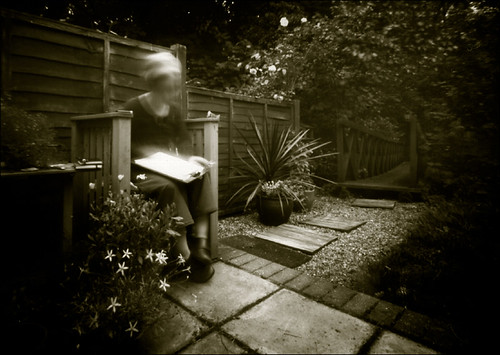
however fast I write, there's always another blank white page to fill, originally uploaded by heyoka.
Off to work today, but wanted to leave a post behind. It's almost like being here in my cool little home office instead of outside, sweating in my tuxedo suit. With little time to write, and a blank screen subsituting for a blank page, I'm going to cheat a little. The following previously appeared in I'M REALLY NOT A WAITRESS, my blog on Publisher's Marketplace.
THE BEST JOB FOR A WRITER or LUCY, ADVICE 5 CENTS
Well, we all know what the best job for a writer is. It's writing! It's staying home, sitting around in your ratty black yoga pants, drinking coffee, eating chocolate, and hammering away on the keys of your computer like a happy little woodpecker. And oh yes, I almost forgot to mention -- getting paid for it. Getting paid real money. Getting paid enough that you don't have to seek outside employment to cover little things like eating and keeping the rain off your back.
Unfortunately, they don't advertise in the Help Wanted section for that particular job -- at least if you're a fiction writer; there's no place to put in an application; and when you send out your hopeful little query letters or your professionally formatted manuscript, you're usually greeted with the same response. We don't want you, we don't need you, and we're willing to bet no one else does either. (Usually, those words come in code that reads something like this: We're sorry, but this doesn't meet our present needs.) To which the strong, dedicated writer yells in the privacy of his or her own study: Oh, yes you do ! You just don't know it yet! Then she goes back to the computer even more determined to prove why the world needs her and her crazy stories.
But meanwhile, her stomach is grumbling for lunch. And if she/he has kids, their little stomachs are making some noise, too. So the writer has to change out of her yoga pants, put her computer on sleep, and seek work in the wide world. The next question becomes what kind of job will support her writing addiction -- or at least not totally crush it.
Before I began my illustrious career as a waitress, I had the brilliant idea that I would find a job where I could write at work. If I couldn't get paid for the writing itself, I would at least write and get paid at the same time.
With that in mind, I applied to become an all night desk clerk at a seedy motel, a lifeguard in a rarely visited pool (though that dream was promptly quashed by my lack of certification and my doggy paddle.) I also checked out those little carts in the mall. A lone employee sat on a stool, often reading a paperback novel, as oblivious to the shoppers swirling around her as they were to the "store" she was hired to mind. Bingo.
Since the job paid crap, you worked alone, and it was boring as hell (except to a writer who planned to find a world of excitement in the pages of her spiral notebook), I was hired on the spot.
The very next day, I packed my bookbag feeling like I was heading off to a writer's retreat, or the first day of school. Inside was my new notebook, its blank pages sullied only by the title of my novel, two pens (in case I wrote so much that the first ran out of ink), my coffee money, and an apple for lunch. This was to be a monastic regimen of serious writing and pure eating.
Things went pretty well for a month or so. The novel zipped along at a nice pace; sales at the floundering little business were so dismal they rarely intruded on my concentration, and I worked as if I were at a mountain retreat rather than in the center of a noisy mall. I felt pretty healthy and virtuous, too, as I followed Ben Franklin's advice about an apple a day.
But the second month, I ran into a couple of obstacles. First, I lost my way in the novel, and began to doubt both the work -- and myself. A common obstacle for writers, but since this was my first attempt to write a novel, I thought I was alone in the wilderness. And then, I began to make friends in the mall. Within weeks, the job went from a solitary refuge within myself to a day long talk fest. (I also developed a craving for bean burritos, which seriously disrupted my dedication to the pure life, but that's another story.
First "Tom," the candlemaker who owned the neighboring cart began to stop by for coffee every morning. As a young man, Tom had entered the priesthood, but had been asked to leave because he couldn't master Latin. (This was pre-Vatican II.) Accepting it as God's will, he married and supported five children as a machinist for thirty years. That's when the plant closed, leaving him with no pension or insurance. What little savings he had was siphoned into the dream of owning his own business. Despite his work ethic, the care and yes, love, he brought to his craft, and an unshakably positive spirit, it was obvious to me that the candle business would never make it. It closed up around the time I quit my job.
It's been years since I've seen Tom, but I think of him often -- and of the integrity and character that shone through everything he did. No matter what his life story says about him, he remains in my mind, one of the most successful people I've ever met.
Most of my new friends, however, came from the army of the dispossessed who spend a disproportionate amount of time in malls because they have no place else to go. Or because they so desperately need to hear another human voice that it doesn't matter if it's only the cashier at McDonald's saying, "Do you want fries with that?"
There was "Charlie," the schizophrenic son of a wealthy New York physician who lived in a halfway house in town. Charlie visited on a daily basis, often stopping by when he felt most agitated. I would do my best to calm him down, but I could never answer the questions that troubled him most: Why did this happen to me? Why can't I find a woman to love me? And why won't my family let me come home for Christmas?
Then there was "Harold", a semi-retarded man who also returned for a daily visit after he was fired from his maintenance job at the mall. He loved to brag about the beauty of his girlfriend "Heather".
I was glad that he had her in his life -- until all three hundred pounds of Heather appeared at my cart, and threatened to kick the shit out of me if I didn't stay away from her man. When Harold showed up the following day, bruised and bandaged around the head, I realized exactly how serious she was.
Those are only a few examples of the numerous friends and visitors to the cart that ultimately derailed my writing plans, and almost got me fired. Apparently, while I entertained the lost, other shopkeepers were watching and reporting what they saw to my employer. Eventually my boss showed up, sarcastically threatening to hang a sign saying "Lucy, Advice 5 Cents" whenever I was working. He was so angry the veins in his head were bulging, but I kind of liked the image. It was, in many ways, the story of my life.
That was around the time my career as a hawker in the mall ended for good. I took from it 103 pages of a novel that would never be finished, an addiction to bean burritos, and the lonely stories my mall friends shared with me. As a writer, how could I ask for more?
Friday, August 12, 2005
THE MUSE RESPONDS!
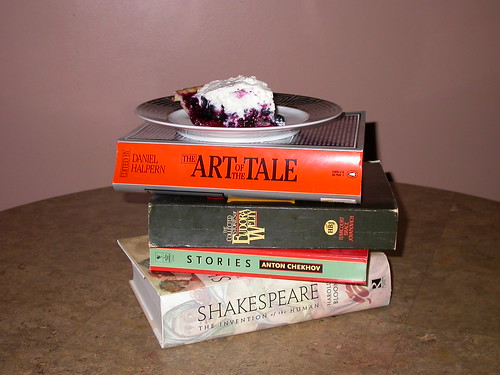
Photograph by Ted Lukac
So there I was on one of the hottest, most suffocatingly humid days of the year, a pristine beach lying just down the road, and what am I doing? Bustling around a stifling kitchen like some grandma from another era, with the oven cranked to 400 degrees. That's right; I'm baking a pie for my muse. Well, you know what they say about us writer people. Bonkers, every one of us.
Since I was alone in the house, I was also talking to myself. Or maybe talking to my muse. Telling her about my literary aspirations, and reminding her of my continuing struggle with sloth and self-doubt. (As if she didn't know!) If the pie came out perfect, would she do something about that please?
"Not my job," the muse responded crankily. "My job is to give you ideas, which I do in abundance--if you're too flaky to use them, it's not my problem." (If there's one thing I can't stand, it's a wiseass muse.)
So yes, I was baking a pie, but I also had the distinct sense of performing some literary witchcraft. Me and my friend, Susan, who I've never met baking the same crazy pie in the same crazy August heat. By then, I'm not only talking to myself and my wiseass muse, I'm laughing out loud all alone in the house. Hmmm...what was it I said about writers?
Anyway, the pie was magnificent. And the best thing about baking for your muse is that you get to eat the results yourself--which I did, two whole pieces. Though I'm usually a Calvinist when it comes to dessert, this was different. This was for Literature, capital L. Gorging on a couple of pieces of pie was the least I could do!
So that was Wednesday, and I have to admit yesterday was a pretty good day writing- wise. I got up to find that overnight several of my incredibly wonderful and unbelieivably kind blogging friends had left some really nice comments about my last post. Do you guys have any idea how happy you made me?
A little later, I set off to the post office to mail a manuscript off. There I ran into my friend, Gina, who is one of the few pure souls on this earth. Serendipity! Immediately, I called her to the counter so she could bless the manuscript before it was shipped off. I was going to ask Kristen, my favorite at the post office, to join in the ritual, but she looked a little freaked out by our odd behavior already.
At home, I added six pages to a long neglected writing project. And if that wasn't enough to make it a banner day, I got an email from Literary Mama, telling me that my story, "Live Pure, Live True" was up on their site. Whoa! Is this a coincidence or does my muse really like blueberry pie?
All I can say is that if the manuscript I posted yesterday is accepted, I'll apologize for calling my muse a wiseass and make her a pie every year for the rest of my life. And if it's not? Well, I'll still keep writing and baking pies. We writers never give up.
Wednesday, August 10, 2005
REAL LIFE INTERRUPTS MY READING ★
CATEGORY: DAY TO DAY SURVIVAL
Yesterday, I had a chance to spend some time observing life in a doctor's waiting room.
I'd brought the novel I'm currently reading along, and planned to make some progress through its daunting (but wonderful) 500 pages while I waited for a family member.
I had just found my place in the book and read a few sentences when a man in his late thirties entered and made a point to say good morning to everyone.
Hmmm...I wondered, hasn't he heard of the rules of the anonymous waiting room? These people are not your friends; what's more they're ahead of you in lines so you better hope their maladies are neither too serious, nor too trivial. (The trivial ones are usually those of hypochondriacs; and we all know how time consuming their proliferating imaginary complaints can be.)
A few people grunted; I gave him a cautious smile and returned to my book.
However, only a minute or two later, I was again distracted by the entrance of a woman who carried her life through the door like a heavy sack she'd been dragging around for far too long. I immediately closed my book in deference to her misery.
Yes, she was elderly, though not terribly (70 maybe?) and perhaps sick, but the weight she carried was heavier than mere age--or even illness. I studied her flaccid arms, the downward slant of her face and voice, and wondered if she had once been pretty. If she'd ever been in love, had once entered the room as cheerily as the man who came before her. Of course, she had. As she sat down heavily beside me, the small space was infected with her private sorrow.
I couldn't even pretend to read.
Soon after the woman entered, her husband followed, complaining loudly that it would have been nice if she waited for him. Didn't she knew he needed help getting up the stairs?
"I was trying to do you a favor by checking you in," the woman grumbled.
"Well you could have at least helped me up the stairs."
He then announced to the waiting room (also in defiance of the unwritten code) that he'd hurt his acchilles tendon in a recent tennis match, and was having trouble walking.) In truth, he was tanned, wearing an explensive looking gold outfut, and looked far healthier than his wife.
The friendly younger man immediately offered him a seat, and some commiseration. "That's a painful injury. Friend of mine had that once."
The old man grunted, but his curiosity was aroused. "What are you here for?"
"My knee. After arthroscopic surgeries, I'm still having trouble. Might have to get a knee replacement."
Briefly, the miserable woman looked up from The New York Times where she had retreated from her husband's castigation. "I had one of those. It was horrible. Worst thing I ever did."
"It was her own fault," her husband scoffed. "She never did her exercises. How did she think she was going to get better?"
The question hung in the air. I wondered if he ever addressed her directly.
"You two havent' been married long, have you?" the young man smiled.
"Too long. Far too long." The man in the golf shirt shook his head, as if dislodging the years. "Never thought I'd spend my retirement like this. I've got a house on the ocean, a winter place in Palm Beach, but what good does it do me? She never wants to do anything."
Again the young man laughed. "You better watch out. I think your wife's about to give you a left hook." (In truth, the wife had once again withdrawn, and seemed impervious to her husband's words.)
Briefly, the waiting room fell into an awkward silence. I thought of taking out my book again. But once again the older man interrupted my thoughts, turning to the resolute optimist across from him.
"What do you do for a living anyway?" I had the feeling he was accustomed to sizing people up with this question.
"I'm a mechanic over at the XX Plant. You know, one of the working stiffs waiting for the trickle down."
"Better leave politics out of it, young man, because I don't think we agree."
"You're right. We probably don't." The smile never left the younger man's face.
At that point, he was called into the office, and the conversation ended.
I managed to read five or six pages before he emerged.
"So what did he say?" Golf shirt asked. "Are you going to need the knee replacement?"
By now, the entire waiting room was engaged. We all looked up.
"Afraid so."
Even the wife was interested. She shook her jowls in warning. "The worst pain I ever had. More excruciating than childbirth."
"I'll be okay," the young man laughed.
But the woman was not going to give up. Pain was her subject and she would not cede a point to an obvious amateur. "You wait and--"
This time, however, he stopped her. "No, really, I'll be okay." And as he waved and wished us all luck, I knew that he would.
Soon, the husband and wife team were called inside, too; and the waiting room was quiet. But I was no longer interested in my book. Sometimes a half-hour in a waiting room is as complicated and profound as a 500 page novel anyway.
(So what do the sun flowers have to do with it? Not much, except that they remind me of a stranger's smile that briefly transformed an anonymous waiting room into a place where common humanity overcame any number of differences.)
Sunday, August 07, 2005
BAKE A PIE FOR YOUR MUSE
After posting my entry, the magic of the blueberry pie continued. I was contacted by writer, Susan Messer who swore she had the recipe for the pastry I'd described. Ever since the pie brought us together, Susan and I have shared a wonderful correspondence; we've exchanged insights over our novels in progress, the constant struggle to balance renumerative work with the work of our minds and hearts, and much more. She even did a couple of guest blogs for me over at I'M REALLY NOT A WAITRESS. Thus the magic of the pie was spread to the many readers who were engaged, amused, and inspired by her pieces.
Since it was the magnificent blueberry that brought us together, we planned to do something special in its honor. My yard was piled high with snow and Susan was braving the legendary Chicago winds when we first began dreaming of blueberry season. Thus, the scheme of baking a pie for our insatiable muses was born.
A few weeks ago, Susan sent me her recipe. It is very much like the one I remember except that Susan layers the whipped cream beneath the blueberries, and Marilynne's hand whipped cream was on top.
Susan made her pie last week; I'm scheduled to make mine on Tuesday. If anyone else would like to join us, please do! Why? Because it's August, because the literary muses are hungry, and because they're known to have a particularly affinity for the color blue. The recipe follows:
THE OFFICIAL LITERARY BLUES PIE
A one crust pie shell (Use pate brisee if feeling ambitious or if you have a particularly demanding muse.)
3/4 cup plus 2 tsp sugar
3 tablespoons corn starch
1/8 tsp salt
1 tablespoon lemon juice
4 cups blueberries, rinsed
1 tablespoon unsalted butter
1 cup well chilled heavy cream
1/4 tsp vanilla
Roll out the dough. Line with foil and fill the foil with rice. Bake in the lower third of a preheated 425 degree oven for 10 minutes. Remove foil and rice and bake
10 - 15 minutes more. Cool on rack.
In saucepan combine 3/4 c. sugar, cornstarch, salt, lemon juice and 1 1/2 c. berries. Cook over moderate heat, stirring for 4 -5 minutes. until it is thickened. Remove the pan from heat, stir in butter and the remaining 2 1/2 c. blueberries. Let mix cool to room temperature. Chill for 15 minutes and stir gently.
Whip the cream until it holds soft peaks, add remaining 2 tsp. sugar and vanilla. Beat until it holds stiff peak. Spread whipped cream in pie shell with a spatula. top it with the blueberry mixture. Chll the pie for 1 -12 hours.
And oh yes, don't forget the most important ingredients of all: Eat it with good company and make sure you discuss something literary while you're enjoying your pie. Then sit back and wait for the magic. I expect a full report.
Saturday, August 06, 2005
IN AUGUST
The deck where you have watched the birds while sipping your morning coffee, or drank in a sunset with your glass of wine will grow chill and drive you inside. But not today. Not while August lingers.
The trees that have cossetted you, enclosing you from the outside world with their abundant green will give up their protection as they grow spare. The beaches will return to their lonely whiteness, your body to its winter pallor. But not now. Not yet.
And it is the not yet that lends the waning days of August their particular sweetness. That reminds us to walk outside and see it. Taste it. Inhale it. Because like our own life, it will end. But not yet.


Shevonne & Nellie
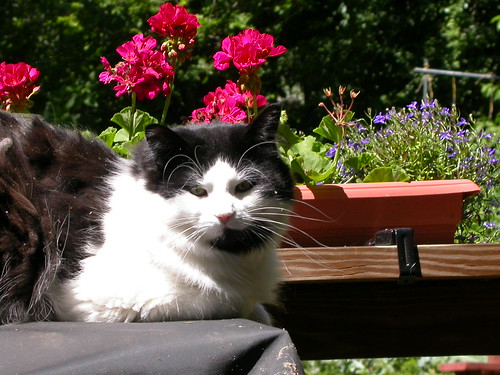
Berlin on the Deck with Geraniums
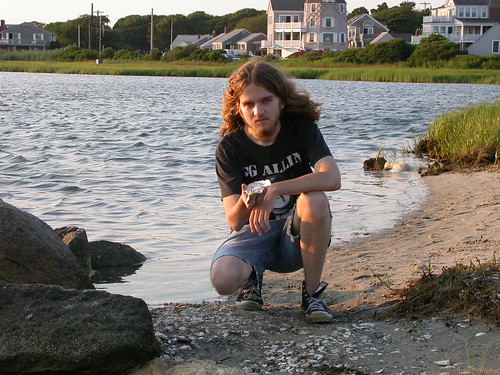
Jake

All Photos (except Nellie and Shevonne) by Ted Lukac
Wednesday, August 03, 2005
THE UNLIKABLE PROTAGONIST

It is an equation that anyone who has ever sent a manuscript to an editor or agent knows by heart: Unlikable protagonist = Prompt rejection. And in many ways, the very words of the equation announces its logic. PRO means for, and how the hell am I going to be FOR someone I innately dislike? Besides, there's lots of characters roaming around lots of stories inside lots of book covers (some would say TOO many, the unpublished would say too few, but that's another subject.) My point here is why spend your vanishing leisure time with one you don't like?
You may have to grin and cluck at a boss you can't stand, may even be stuck in a marriage with a spouse who has revealed sides of his or her character that were in shadow before the ceremony. Aside from the messy business of quitting your job or getting a divorce, you're stuck with those particular "characters". But the characters in a book? If they grate on your nerves, you can close the book with a triumphant thump, and never encounter them again. Go hang out with someone sweet and quirky like Holden Caulfield, or turn to the ever sage Atticus Finch to elevate your character.
The only trouble with the equation is that sometimes a dark, self-centered, miserable protagonist can be frankly fascinating. Especially when they're honest about it. You find me narcissistic and vaguely despicable? this type of character says. Guess what? So do I. And what's more, if you stick around I'll tell you why.
Such is the case of Eva, the protagonist of WE NEED TO TALK ABOUT KEVIN. She's selfish, she's a misanthrope; she's a deadly poor mother, but I hated for her story to end. In fact, this grim but absolutely absorbing story gives you no one to root for. Besides Eva and the sociopathic son who is the product of her genes and her coldness, there's her All-American husband, Franklin. Though he is painted as the good guy, I found him positively infuriating. In fact, I couldn't see what Eva--who possessed a fine intelligence despite her flaws, ever saw in this dolt. The constant excuses he makes for his son's anti-social behavior are supposed to bespeak all-American optimism. To this reader, they merely suggested the willful blindness that is perhaps the worst of our flaws. And even the blandly sweet Celia hardly comes off as a likable character. Her vapid and fearful nature is so cloying that this reader ended up preferring the company of her malevolent brother.
I know I recommended this dark, provocative and utterly brilliant novel when I was 100 pages into it. So why have I returned to do it again? Because it's that good. Good enough, in fact, that maybe some of those editors should reconsider the Unlikable Protagonist equation when it comes to the work of lesser lights than Lionel Shriver.
Tuesday, August 02, 2005
FIVE THINGS TO DO ON YOUR BIRTHDAY
2. Eat cake if you're under 18 or over 75.
If you're in between, these are your years of discipline and clarity. Look at that pretty mass of sludge and goo for what it is.
3. Ask yourself where you came from and where you're going. If the answer is, "I don't know," spoken with marvel and wonder, you're on the right track.
4. Thank your mother. Chances are the occasion you're celebrating was a pretty arduous day for her.
5. Be a child. Hang balloons outside your door. Announce to random strangers that it's your birthday. Okay, even eat the artery clogging, blood sugar elevating, thigh thickening cake if you have to. And if there aren't any random strangers around, announce it on your blog: Hey, it's my birthday! Aren't I cool?

